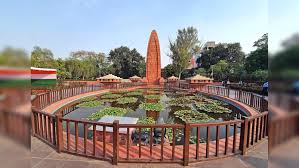On April 13, 1919, Brigadier-General Reginald Dyer ordered British forces to open fire on a peaceful gathering in Jallianwala Bagh, Amritsar, creating an indelible mark on India’s cultural consciousness.
Jallianwala Bagh Massacre
Background: Protesting the contentious Rowlatt Act
- The Imperial Legislative Council passed the Anarchical and Revolutionary Crimes Act of 1919.
- It authorised the British government to arrest anyone suspected of terrorist activity.
- It also authorised the government to hold such apprehended individuals for up to two years without trial.
- It authorised the police to search a location without a warrant. Furthermore, it severely restricted press freedom.
- The colonial government’s major goal was to control the country’s developing nationalist movement.
- The British were also concerned about a Ghadarite Revolution in Punjab and the rest of the country.
The day
- The massacre occurred on April 13, 1919, when troops from the British Indian Army (Gurkha and Sikh infantry battalions) led by Col. Reginald Dyer opened fire on a crowd of Indians.
- Civilians had gathered in a peaceful protest to oppose the arrest and deportation of two national leaders, Satya Pal and Saifuddin Kitchlew.
- Without warning, Dyer ordered his forces to fire on the unarmed crowd, which included children.
- The indiscriminate firing lasted around 10 minutes, killing at least 1000 people and injuring over 1500 more.
Aftermath
- Rabindranath Tagore renounced his knighthood to protest the massacre.
- Gandhiji renounced the title ‘Kaiser-e-hind’ bestowed upon him by the British for his contributions during the Boer War in South Africa.
- Michael O’Dwyer, the then Lieutenant-Governor of Punjab who had approved Dyer’s conduct, was assassinated in London by Udham Singh in 1940 in retaliation for the massacre.
- The heroic treatment of Dyer’s horrible deed once again established a standard of imperial arrogance.
Hunter Commission of Inquiry
- In October 1919, Edwin Montagu, the Secretary of State for India, established a committee to investigate the occurrences in Punjab.
- Originally designated as the Disorders Inquiry Committee, it became more generally known as the Hunter Commission.
- The commission investigation was ended with no notable findings.
- Nonetheless, India has long demanded that Britain apologise for the carnage.
Source: https://indianexpress.com/article/india/tributes-jallianwala-bagh-massacre-anniversary-9267314/#:~:text=On%20April%2013%2C%201919%2C%20a,General%20Reginald%20Edward%20Harry%20Dyer%2C

